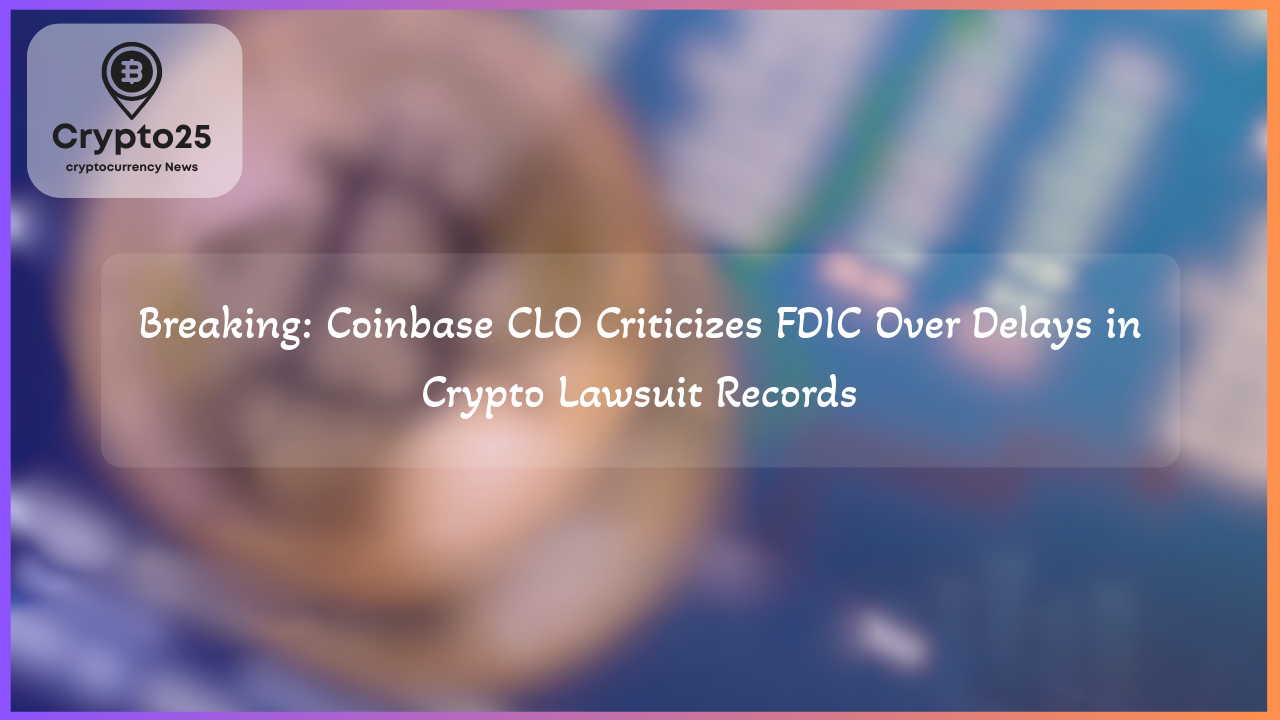
Coinbase and the FDIC: A Legal Battle Over Crypto and Banking Regulation
Coinbase, the renowned cryptocurrency exchange, finds itself at the center of a high-stakes legal dispute with the Federal Deposit Insurance Corporation (FDIC). This case stems from allegations that the FDIC participated in a covert operation—dubbed “Operation Chokepoint 2.0”—to exclude crypto firms from the U.S. banking system. The ongoing tension highlights the clash between the expanding crypto landscape and traditional financial institutions.
### Coinbase Challenges FDIC Motions in Court
The legal standoff began after Coinbase filed a public records lawsuit to access FDIC documents it believes reveal a coordinated campaign to debank cryptocurrency firms. In a court motion submitted Thursday, Coinbase strongly opposed the FDIC’s request to extend its response deadline by 16 days. The crypto giant, represented by Chief Legal Officer Paul Grewal, dismissed this extension as “absurd,” noting the agency had ample time to meet its legal obligations.
Grewal criticized the FDIC’s motion, highlighting inconsistencies in their rationale. He pointed out that the agency previously stated it only required 30 days to dismiss motions but later filed a 13-page extension request. Instead of being a straightforward legal matter, Grewal alleges the FDIC’s delay tactics may serve to further isolate crypto entities in the U.S. financial market.
Coinbase asserts the FDIC’s refusal to adhere to established deadlines undermines the judicial process while exposing broader attempts to stifle crypto innovation under the guise of bureaucratic procedures. The clash underscores a growing narrative of regulatory hostility toward digital assets in the United States.
### Operation Chokepoint 2.0: Regulatory Suppression of Crypto?
At the heart of this legal saga lies Coinbase’s claim about “Operation Chokepoint 2.0.” The term refers to alleged backdoor efforts by federal agencies to marginalize crypto companies without formal regulation or congressional oversight.
In February, the FDIC released nearly 800 pages of internal documents following legal and public pressure. These documents revealed that some financial institutions were discouraged—if not outright prohibited—from offering banking services to crypto-related businesses. Even companies free of systemic risks were reportedly warned about “reputation risks” associated with engaging in cryptocurrency transactions.
Such revelations have intensified the scrutiny surrounding the FDIC’s actions, particularly under the Biden administration. Critics argue that this informal campaign undermines lawful businesses by leveraging regulatory power to isolate an emerging industry. Notable figures in the crypto sphere, including Coinbase CEO Brian Armstrong, have labeled this campaign as both unethical and an affront to free markets.
| Title | Details |
|---|---|
| Market Cap | $1.2 Trillion |
| FDIC Document Release | 800+ Pages |
| Crypto Businesses Affected | Dozens Suspected |
This assertion of regulatory overreach has caught the attention of the U.S. House Oversight Committee. Lawmakers are now investigating whether agencies like the FDIC improperly used reputation risk warnings to debank lawful crypto enterprises. As part of this inquiry, representatives have reached out to Coinbase, Andreessen Horowitz, and other key stakeholders to secure testimony and supporting documents.
### The Bigger Picture: Crypto’s Fight for Financial Inclusion
Coinbase’s legal battle against the FDIC is emblematic of a larger conflict between the innovative world of cryptocurrency and traditional finance’s gatekeepers. The industry is no stranger to criticism or regulatory challenges, but accusations of covert efforts to suppress crypto raise troubling questions about accountability in U.S. financial governance.
Decentralized finance and blockchain technology have been hailed as transformative forces capable of empowering unbanked populations, offering greater transparency, and reducing the monopolistic grip of traditional institutions. However, these benefits may be undermined if federal agencies continue to wield undue influence over financial markets.
As Coinbase awaits the court’s decision on the FDIC’s response timeline, the broader implications for the crypto industry remain significant. A favorable verdict could shed more light on the alleged informal policies discouraging banks from working with digital asset companies. Conversely, prolonged legal delays risk eroding trust in the regulatory process.
At a time when global interest in crypto is surging, the United States faces mounting pressure to clarify its stance. Whether the judiciary will side with innovation or continue to enable regulatory opacity could set the tone for decades to come.
—
With its wide-ranging implications for financial freedom and technological innovation, the Coinbase-FDIC case is one to watch—and for crypto advocates, the stakes couldn’t be higher. Stay tuned for updates as this legal battle continues to unfold.
